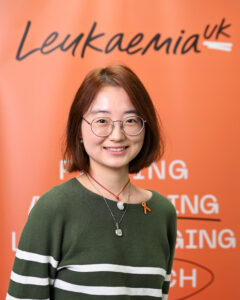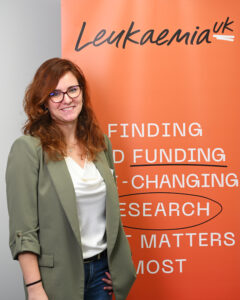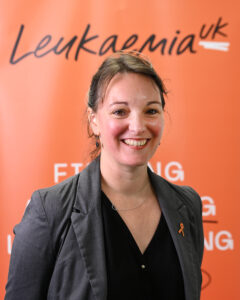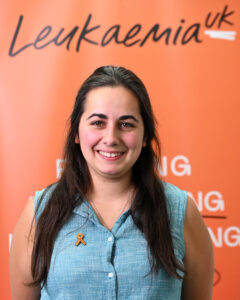
23 Oct 2024 Research
Leukaemia UK announces innovative projects by four female researchers addressing aggressive blood cancers
Leukaemia UK has today announced it will invest £600,000 into four groundbreaking research projects aimed at developing kinder, more effective treatments for various aggressive blood cancers, including acute myeloid leukaemia (AML), Burkitt lymphoma (BL), and T-cell acute lymphoblastic leukaemia (T-ALL).
Through its prestigious John Goldman Fellowship scheme, Leukaemia UK is funding pioneering projects led by four talented female researchers: Dr Yang Li (University College London), Dr Giorgia Chiodin (University of Southampton), Dr Cecile Lopez (University of Cambridge), and Dr Eliza Yankova (University of Cambridge).

T-cell acute lymphoblastic leukaemia (T-ALL), is a serious blood cancer that primarily affects children and young adults. Dr Li will focus on the TAL1 gene, which is elevated in about half of T-ALL cases and contributes to cancer growth. By studying how TAL1 interacts with other proteins, Dr. Li aims to develop targeted therapies to disrupt this cancer-promoting process. T-ALL is aggressive, and patients who relapse or do not respond to initial treatments have limited options; while some may achieve remission with chemotherapy, there are currently no CAR-T cell therapies available for T-ALL.[1] This underscores the urgent need for new treatments to effectively target the disease and improve survival rates. Dr. Li’s research will investigate TAL1’s role in driving the cancer, with the goal of identifying new therapeutic targets for better treatment options.
Dr Yang Li said: “It is an honour to be awarded this Fellowship and for my career to get this kind of recognition. Leukaemia UK’s support provides me with the opportunity to really focus on the pathway I wish to develop my own career in the hope of opening more treatment options for people diagnosed with this type of leukaemia.”

Burkitt lymphoma (BL) is a fast-growing and aggressive type of non-Hodgkin lymphoma that targets B cells in our immune system. Unfortunately, it comes with a poor prognosis.[2] One intriguing aspect of BL is the sugar modifications, known as N-glycosylation sites, found on immunoglobulin proteins that might influence how the tumor behaves. While previous studies on similar cancers suggest these sugar changes could play a significant role in tumor growth, their exact impact on BL is still a mystery.
To tackle this, Dr Giorgia Chiodin is diving into research involving data from a large cohort of BL patients. She’ll explore where these sugar modifications are located and how they relate to patient outcomes, aiming to uncover vital patterns that could inform treatment strategies. Using advanced lab techniques, Dr Chiodin will also identify the specific sugars attached to these proteins and test their effects on BL cells by creating models with and without these modifications. This research has the potential to unlock new insights into how sugar changes affect cancer progression and pave the way for targeted therapies to fight this challenging disease.
Leukaemia UK’s final two awards, focus on acute myeloid leukaemia (AML), an aggressive type of leukaemia affecting the blood and bone marrow. This disease is known for its rapid progression and challenging treatment. The researchers are exploring critical areas such as genetic mutations and treatment resistance to uncover innovative strategies that could improve patient outcomes and offer hope to those affected by this devastating illness.

Dr Cecile Lopez is investigating the role of the ERG gene in acute myeloid leukaemia (AML), a highly aggressive blood cancer. Her research aims to uncover how ERG influences gene expression and genome organization within leukaemia cells. Understanding these mechanisms is crucial, as excessive ERG production is linked to AML progression, allowing cancer cells to thrive by activating growth-promoting genes while suppressing those that encourage cell differentiation.[3] With a five-year survival rate of only 22% for AML, identifying new therapeutic targets through this research could lead to more effective treatments and ultimately improve patient outcomes.
Dr Cecile Lopez said: “This Fellowship is incredibly important to me as it provides me with a wonderful opportunity to carry out vital research for people affected by AML, which is one of the most common types of leukaemia. I hope to play a part in ensuring that people diagnosed with AML have the best chance of benefiting from the most effective treatments.”

Dr Eliza Yankova is focused on developing innovative treatments for AML by targeting the enzyme METTL1. This enzyme has been found to play a significant role in the development of AML by creating a chemical marker on tRNA molecules, which helps cancer cells survive and proliferate. Dr Yankova and her collaborators aim to create a small-molecule inhibitor that blocks METTL1’s activity, potentially slowing down leukaemia growth while sparing healthy cells. As previous experiments have shown promising results in reducing AML progression without harming normal blood cells, the next step involves testing this new drug in laboratory settings and animal models, hoping to find a safe and effective treatment for this challenging disease.
Each of the John Goldman Fellowships will run for a minimum of 18 months.
Fiona Hazell, Chief Executive of Leukaemia UK, said: “We’re delighted to have awarded John Goldman Fellowships to such innovative projects, focussed on improving outcomes for particularly aggressive forms of blood cancer. Spear-headed by pioneering early career researchers, these vital insights could unlock the better, kinder and more targeted treatments desperately needed to transform outcomes for patients. “
Applications for the 2025 John Goldman Fellowships will open in December.
[1] Mark Hartmann, Mariam Hakobyan, Jens Langstein, Maximilian Schönung, Sina Stäble, Aurore Touzart, Justyna A. Wierzbinska, Daniel B. Lipka, Chapter 13 – Epigenetic regulation of normal hematopoiesis and its dysregulation in hematopoietic malignancies, Editor(s): Dieter Kabelitz, Jaydeep Bhat, In Translational Epigenetics, Epigenetics of the Immune System, Academic Press, Volume 16, 2020, Pages 285-313,
[2] https://www.nature.com/articles/s41572-022-00404-3
[3] Knudsen KJ, Rehn M, Hasemann MS, Rapin N, Bagger FO, Ohlsson E, Willer A, Frank AK, Søndergaard E, Jendholm J, Thorén L, Lee J, Rak J, Theilgaard-Mönch K, Porse BT. ERG promotes the maintenance of hematopoietic stem cells by restricting their differentiation. Genes Dev. 2015 Sep 15;29(18):1915-29. doi: 10.1101/gad.268409.115. PMID: 26385962; PMCID: PMC4579349.
All photos ©Jake Darling Photography
Related posts
31 August 2023
“Henry’s death cannot have been for nothing” says bereaved Mum as charities fund new research into devastating infant leukaemia
Callan Brett, a mother-of-two from Ipswich, has welcomed news of a pioneering new research project into infant leukaemia; having lost her youngest son to the rare form of blood cancer…
11 August 2021
Dr Samanta Mariani recognised for her innovative research through Leukaemia UK John Goldman Fellowship and Olive Boles Innovation Award
We are delighted to announce the Leukaemia UK John Goldman Fellowship and Olive Boles Innovation Award has been awarded to Dr Samanta Mariani, in recognition of her innovative research that could contribute significantly to our understanding of leukaemia and other blood cancers.
25 May 2022
Leukaemia UK reveals new strategy to go further than ever to stop leukaemia devastating lives
Leukaemia UK has revealed a new strategy to go further than ever to save and improve more lives, through research, awareness and advocacy.
4 September 2023
Less than 1% of Brits can identify all the most common symptoms of one of the deadliest types of cancer
New research launched today by Leukaemia Care and Leukaemia UK reveals that less than 1% (0.4%) of UK adults can accurately identify the four most common symptoms of leukaemia –…